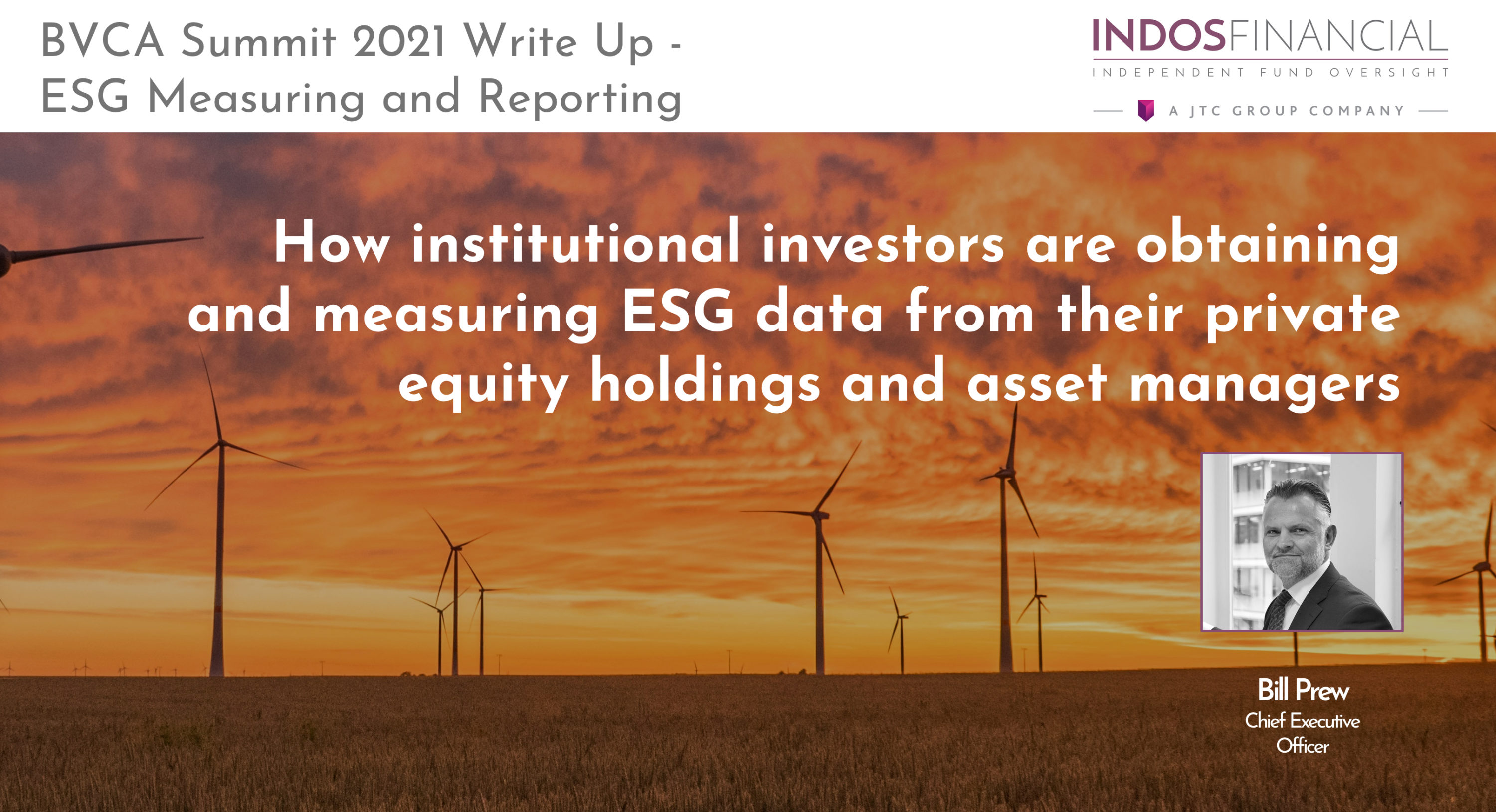Ahead of the COP26 Climate Change Conference, Bill Prew, CEO at INDOS Financial, a JTC Group Company, moderated a panel at the BVCA Limited Partner [LP] Summit 2021 which examined how institutional investors are obtaining and measuring environmental, social and governance [ESG] data from their private equity holdings and asset managers. But what were main discussion points at this year’s LP Summit?
Transparency improvements are still needed
Although disclosure of ESG data by private equity managers to LPs has improved over recent years, investors noted that procuring information can still be a challenge.
The reticence of some GPs to share ESG data is compounded by the fact that it can be difficult to gather post investment information such as carbon emissions from private businesses, at least in comparison to publicly listed companies. Moreover, understanding how companies manage carbon emissions and other ESG risks can also be quite challenging. Assuming private equity managers are happy to share their various ESG metrics, there is also an absence of standardisation in how this information is collected and reported, creating further problems for LPs, especially those invested across multiple funds and asset classes.
One LP highlighted the lack of harmonisation is partly a result of the “alphabet soup of standards” and ESG frameworks being promoted by various industry bodies and supranational groups. Elsewhere, ratings agencies often do not deploy the same methodologies when scoring companies on ESG, meaning that it is not uncommon for the same company to have multiple – or occasionally conflicting – ESG ratings.
All of this makes it difficult for GPs to report accurately on ESG – and in turn enable LPs to obtain a good grasp of ESG risks across their portfolios. Panellists agreed that there could be greater investor collaboration on ESG issues noting that it would help GPs focus more on gathering the right data to report to investors.
Obtaining standards are key
In order to mitigate these challenges, experts at the LP Summit said there needed to be industry-wide agreement on how ESG information is reported to end clients. Some believe GPs should leverage the template being developed by the Institutional Limited Partners Association [ILPA] and other initiatives such as the PRI ESG Due Diligence Questionnaire. Having introduced a common set of principles for GP fee disclosures, ILPA recently launched its ESG Assessment Framework, a toolkit designed to help LPs benchmark their GPs’ ESG credentials. Speakers concurred that the new ILPA ESG Assessment Framework will help support the drive towards greater ESG standardisation.
In addition to industry-led initiatives, Prew noted that a number of regulators are also looking to bring about clarity around how GPs report ESG data.
Although the EU is widely considered to be an ESG reporting trailblazer, one speaker said regulators in the US and UK are also taking a close interest in the issue, adding that TCFD [Task Force on Climate-related Financial Disclosure] reporting requirements will increasingly apply in the UK to pension funds, asset managers, listed companies and other businesses. With TCFD reporting now becoming a regulatory and compliance obligation, there will be greater accountability on asset managers around ESG. Speakers cautioned, however, that GPs need to do more than treat ESG reporting as a compliance exercise and concentrate on integrating ESG into risk and investment management processes to ensure there is tangible progress being made towards achieving net zero.
Service providers can support the industry
Panellists agreed there is a role for service providers to support the industry. While some investors have established their own in-house ESG teams, there are many institutions which need to consider ESG matters and will be reliant on external service providers, particularly in areas such as carbon assessments and collection together with analysis of data.
Pressure on private equity managers will continue
With sustainability now becoming a critical component of the manager selection process, the private equity industry will need to continue to improve its ESG reporting and disclosure to LPs. Regulation and industry-led initiatives such as the ILPA ESG Assessment Framework are likely to play a major role in facilitating this.




